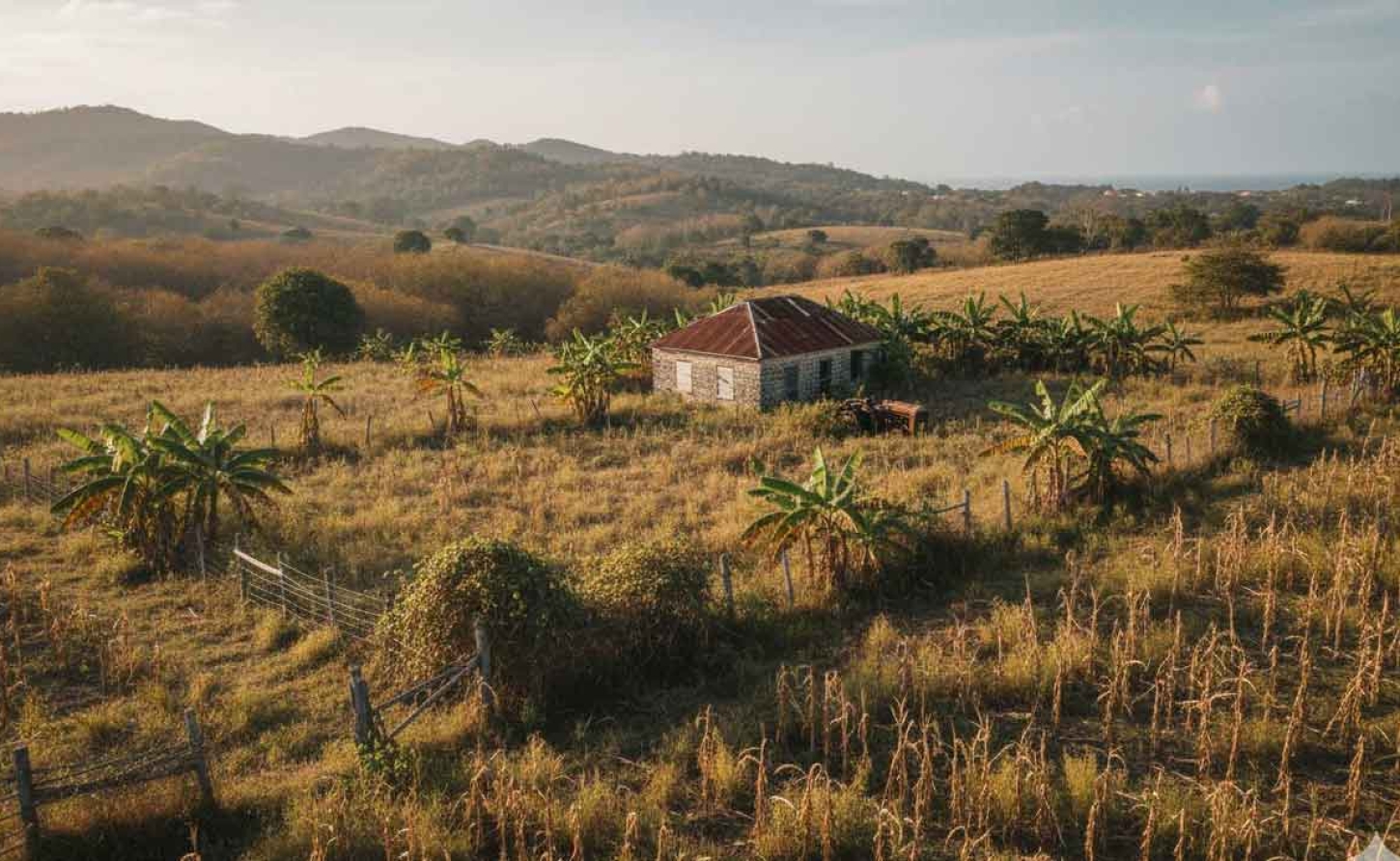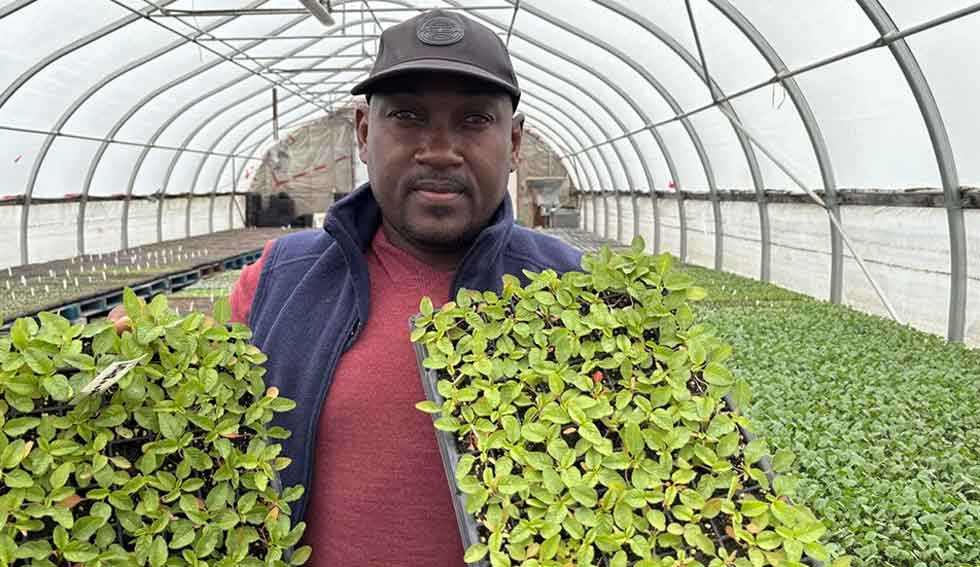JAMAICA'S Food Security Crisis: When Demographic Winter Meets Farm-Workers Drought

Calvin G. Brown
MONTEGO BAY, Jamaica, October 8, 2025 - As Jamaica's fertility plummets and farmland lies fallow, 1.3 million displaced Haitians seek safety—could CARICOM solidarity offer a lifeline to both nations?
Jamaica's fertility crisis isn't just about empty nurseries—it's about empty fields. And as community advocate O. Dave Allen warns of "demographic winter" threatening the nation's future, a parallel humanitarian catastrophe unfolds just 172 kilometers away that might offer an unexpected, if controversial, interim solution.
According to the United Nations Population Fund (UNFPA), Jamaica's total fertility rate (TFR)—the average number of children a woman is expected to stand at just 1.3. This places Jamaica well below the replacement rate of 2.1, below the global average of 2.2, and lower than the Latin America and Caribbean regional average of 1.8.
The island now ranks alongside nations grappling with long-term population decline: China (0.7), Greece (1.3), Japan (1.2), South Korea (0.8), and Italy (1.2). Allen laments this as "a chilling reality that threatens not only our population numbers but the very soul of our culture, productivity, and national identity."
Meanwhile, nearly 1.3 million Haitians have been internally displaced by gang violence, representing a 24 percent increase since December 2024—the largest displacement crisis in Haiti's history. Behind these statistics are families forced to flee their homes multiple times, often with nothing, living in conditions that are neither safe nor sustainable.

Two Caribbean nations, two desperate situations—and perhaps one symbiotic solution that CARICOM's founding principles were designed to address.
The Historical Bridge
The relationship between Jamaica and Haiti runs deeper than most remember. When Haiti first applied for CARICOM membership in 1974, Jamaica's then-minister Percival J. Patterson welcomed the initiative and promised Jamaica's unconditional support.
Though it took nearly three decades, in 1997, Prime Minister Patterson announced Haiti would become CARICOM's fifteenth member, with Haitian President René Préval at his side in Montego Bay.
That solidarity wasn't mere political theater. When Haiti's government was destabilized in 2004, CARICOM announced that no democratically elected government should have its leader deposed, and leaders sought to have President Aristide share his account with them.
Jamaica has consistently championed Haiti within regional forums.
As recently as February 2025, CARICOM continues supporting Haiti through its Eminent Persons Group, with the Community playing a significant role in advocating for increased funding for security and humanitarian relief.
A Labor Partnership, Not Exploitation
Here's the uncomfortable question Jamaica must confront: If Jamaican agricultural workers are valuable enough for Canadian employers to pay premium wages, provide housing, and offer benefits under the Seasonal Agricultural Worker Program that began in 1966—why can't Jamaica create similar opportunities for Haitians fleeing violence?
The numbers tell a stark story. Over 200,000 Haitians were deported back to Haiti last year, placing even greater strain on the country's already overwhelmed social services.
These aren't economic migrants seeking better wages—they're people fleeing gang-controlled territories where armed violence severely disrupts access to basic services, creating a deepening humanitarian crisis.
Winston Simpson of RADA admits Jamaica "cannot get anyone to work" on farms. Port-au-Prince remains the epicenter of Haiti's crisis, with 85 percent controlled by gangs, but violence is extending beyond the capital. What if Jamaica could offer temporary agricultural work permits to Haitians, providing both safety and livelihood?
This wouldn't be charity—it would be pragmatic regional cooperation modeled on successful programs. The Canadian SAWP, which started as a partnership with Jamaica in 1966, has since grown to include multiple Caribbean countries, with 18,000 migrant workers entering annually as of 2005.
Jamaica knows how these programs work because it participates in them—sending workers abroad while its own farms struggle.
The CARICOM Framework Already Exists
The infrastructure for such cooperation isn't hypothetical. CARICOM's main purposes include promoting economic integration and cooperation among members, ensuring benefits are equitably shared, and coordinating foreign policy. The Caribbean Single Market allows for movement of labor between member states.
A carefully structured program could provide:
- Temporary agricultural work permits for displaced Haitians
- Housing in rural areas with labor shortages (addressing Jamaica's housing pressure in urban centers)
- Training in modern agricultural techniques that returnees could eventually bring back to Haiti
- Wages that support both workers and their families while contributing to Jamaica's food security
- A legal pathway that protects workers' rights and prevents exploitation
Lenworth Fulton notes that Jamaica suffers from a "labour paradox"—exporting its agricultural talent while domestic production collapses. Haiti represents potential labor supply; Jamaica represents urgent labor demand. Both nations are CARICOM members committed to regional solidarity.
Confronting the Uncomfortable Truths
This proposal will make many uncomfortable, and rightfully so. Jamaica's own relationship with agricultural labor is "deeply scarred" by slavery's legacy, as the documents note. The optics of bringing Haitian workers to Jamaica's fields evoke painful historical parallels.
But there are critical differences: voluntary participation, legal protections, fair wages, and regional solidarity rather than colonial exploitation. The International Organization for Migration's Director General emphasized that when we invest in humanitarian support, we build resilience and stability that helps stabilize communities.
The alternative is watching both crises deepen. Jamaica continues converting agricultural land to housing developments while unable to attract farm workers. Haiti's displaced population grows, with 83 percent of displaced Haitians relying on already overstretched host communities for shelter.
An Interim Solution, Not a Permanent Fix
This wouldn't solve Jamaica's demographic winter—only addressing fertility rates and retaining skilled workers can do that. Nor would it resolve Haiti's security crisis—that requires the international intervention and political stability CARICOM continues advocating for.
But as an interim measure, it could address immediate needs on both sides. Jamaica gets agricultural labor to prevent further food security deterioration. Haitians get safety, dignified work, and income during their nation's crisis. The region demonstrates that CARICOM solidarity means more than communiqués—it means creative solutions to shared challenges.
The irony is profound: Jamaica worries about demographic decline while a CARICOM partner nation sees its people displaced by violence. Allen warns of "a shrinking workforce, an aging society, and an economy losing its creative edge." Haiti demonstrates what happens when security collapses entirely.
Perhaps the demographic winter and the agricultural drought don't require separate solutions. Perhaps they require Caribbean nations to remember why CARICOM was founded—not just for economic integration, but for the "unity and solidarity among its Members" that the Treaty of Basseterre promised.
The fields of St. Catherine need workers. The displaced of Port-au-Prince need safety. And Jamaica once promised Haiti its unconditional support. Now is the time to make that support tangible.
-30-
